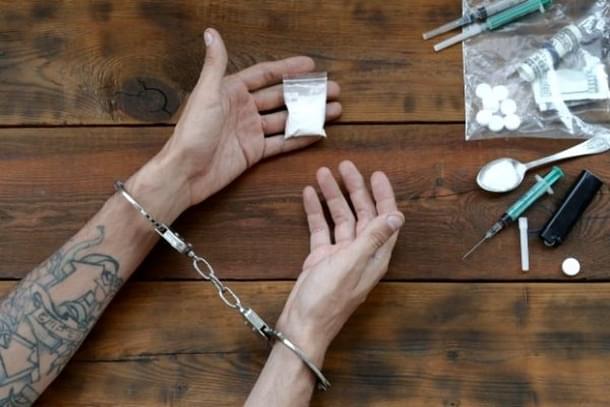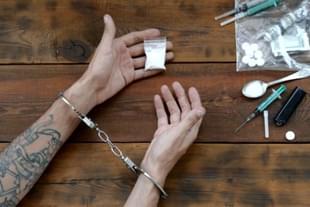Insta
J&K: As Drug Menace From Pakistan Increases, Experts Warn Of Losing A Generation To Narcotics In Valley
PTI
Nov 14, 2021, 04:50 PM | Updated 04:50 PM IST
Save & read from anywhere!
Bookmark stories for easy access on any device or the Swarajya app.


The narcotics menace, especially heroin, is scaling new heights in Kashmir with experts warning that a majority of the young people may fall prey to drug abuse and Jammu and Kashmir Police chief Dilbag Singh blaming Pakistan for targeting youngsters by making them habitual to drugs.
Taking a holistic view of the strife-torn Kashmir valley, police as well as social workers and medical doctors are of the opinion that while the violence caused by three decades of terrorism has consumed a generation, the drug menace will negatively effect the present generation.
Singh pins the blame on Pakistan, saying 'they are repeating the same dirty game that they played in Punjab' -- first giving arms training and later spoiling the youth with drugs.
Asked about the observations made by experts that Kashmir has lost a generation to conflict and may lose the next to drug abuse, Singh replied, 'Definitely, yes and I have no two opinions about it'.
Talking to PTI, Singh said the drug menace has shown a considerable increase in the last two years and the narcotics are smuggled from Punjab and Jammu borders.
“We had some good seizures too. We know that sale proceeds of the drugs are pumped into funding terrorism and, therefore, we have been extra vigilant about it and taking efforts to curb it,' he said.
The main areas affected by the drug menace are Karnah in North Kashmir, Anantnag in South Kashmir and some areas of Jammu, the police chief said.
Police have taken a leading role in setting up drug de-addiction centres in Srinagar and Jammu while some more are coming up in North Kashmir, he added.
'I guess it is time for socio-religious leaders to step in on an urgent basis to wean away youth from the menace. Today, we have time and tomorrow we may not have it. So, it is better to act now and act fast,' the police chief said in his appeal.
Echoing similar views, Dr Mohammed Muzzafar Khan, who heads the de-addiction centre of police in Srinagar, feels that the number of such centres in the valley is minuscule compared to the magnitude of people affected by narcotics.
Khan said the situation on the ground is worse as more and more young boys are getting addicted to narcotics.
“Earlier, we used to see boys aged 18 and above (addicted to drugs) but now there are cases of 12 and 13-year-olds and the nature of drug abuse has changed as well. Earlier, it was charas or medicinal opioids but now heroin is replacing them,' Khan told PTI.
He said youths get addicted to heroin quickly and within days become dependent on injections to inject drugs intravenously and the menace is spread across Kashmir in its urban and rural areas and among the rich and poor population.
Khan said the Youth Development and Rehabilitation Centre headed by him is a 50-bed hospital.
'It is a minuscule facility compared to the number of people affected. I would go on to say that the facility is non-existent... Around 10 years ago, we required de-addiction centres, but today we require a medical emergency facility because sometimes, an addict requires a ventilator immediately due to the overdose of heroine,' he said.
Pointing out to a survey by the National Drug Dependence Treatment Centre of the AIIMS, New Delhi on the 'Magnitude of Substance Use in India' in which Jammu and Kashmir was placed at the fifth spot with over 6 lakh people affected by drug abuse, Khan said, 'I would now say that this is again a conservative estimate.”
'People do not confess to use of narcotics because of social stigma. Seeing the number of patients coming in every month, which ranges anywhere between 10 and 15 per day, I think more people are affected by it,' he added.
Mir Zubair Rashid, co-founder of Concerned About Universal Social Empowerment (CAUSE), an NGO working for providing medical assistance and rehabilitation to drug addicts, said, 'We lost one generation in conflict and next we will lose to drug abuse'.
Rashid and his team have been working round-the-clock to take drug addicts to government hospitals for treatment and following up to ensure there is no relapse and that they remain sober.
'See, post treatment counselling is very important. We are trying to do our bit, but I guess the entire society has to wake up,' he said.
Mantasha Binti Rashid, a 2011-batch Kashmir Administrative Services officer, says, 'Having actively worked on the issue since my university days, I am aware how stigmatised it is to have a family member or a child indulge in abuse. People hide it, attach shame to it and as a result, the treatment suffers along with the health, confidence, self-respect, and quality of life of the abuser'.
'To treat narcotics abuse, a robust support structure, accepting family environment and a positive societal set up is required. And our place does not have much to offer to youth who are already engulfed by this disease. It may be a choice to begin with but as it progresses, it becomes a disease – a disease at an individual level and at a collective level too, if left unchecked,' she said.
This news has been published via a Syndicated feed. Only the headline is changed.





